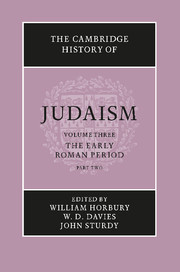Book contents
- Frontmatter
- 1 The archaeology of Palestine 63 bce–ce 70
- 2 The Herodian Temple
- 3 Recent archaeology in Palestine: achievements and future goals
- 4 The contribution of Jewish inscriptions to the study of Judaism
- 5 The social, economic and political history of Palestine 63 bce–ce 70
- 6 The Diaspora in the Roman period before ce 70
- 7 The Gentiles in Judaism 125 bce–ce 66
- 8 Gentiles as seen by Jews after ce 70
- 9 The synagogue
- 10 The Temple and the synagogue
- 11 The early liturgy of the synagogue
- 12 Women in the synagogue
- 13 The Pharisees
- 14 The Sadducees – their history and doctrines
- 15 The Essenes
- 16 The baptist sects
- 17 The troublemakers
- 18 The Samaritans and their sects
- 19 Galilean Judaism and Judaean Judaism
- 20 Jesus: from the Jewish point of view
- 21 Paul: from the Jewish point of view
- 22 Jewish Christianity
- 23 Apocalyptic: the disclosure of heavenly knowledge
- 24 The Qumran sectarian writings
- 25 The Dead Sea Scrolls and pre-Tannaitic Judaism
- 26 Prayer in the Qumran Texts
- 27 Philo of Alexandria
- 28 Josephus (ce 37–c. 100)
- 29 The rabbi in second-century Jewish society
- 30 The Hellenistic–Roman Diaspora ce 70–ce 235: the archaeological evidence
- 31 The legacy of Egypt in Judaism
- 32 Jewish elements in gnosticism and magic c.ce 70–c.ce 270
- Bibliographies
- Index
- References
17 - The troublemakers
Published online by Cambridge University Press: 28 March 2008
- Frontmatter
- 1 The archaeology of Palestine 63 bce–ce 70
- 2 The Herodian Temple
- 3 Recent archaeology in Palestine: achievements and future goals
- 4 The contribution of Jewish inscriptions to the study of Judaism
- 5 The social, economic and political history of Palestine 63 bce–ce 70
- 6 The Diaspora in the Roman period before ce 70
- 7 The Gentiles in Judaism 125 bce–ce 66
- 8 Gentiles as seen by Jews after ce 70
- 9 The synagogue
- 10 The Temple and the synagogue
- 11 The early liturgy of the synagogue
- 12 Women in the synagogue
- 13 The Pharisees
- 14 The Sadducees – their history and doctrines
- 15 The Essenes
- 16 The baptist sects
- 17 The troublemakers
- 18 The Samaritans and their sects
- 19 Galilean Judaism and Judaean Judaism
- 20 Jesus: from the Jewish point of view
- 21 Paul: from the Jewish point of view
- 22 Jewish Christianity
- 23 Apocalyptic: the disclosure of heavenly knowledge
- 24 The Qumran sectarian writings
- 25 The Dead Sea Scrolls and pre-Tannaitic Judaism
- 26 Prayer in the Qumran Texts
- 27 Philo of Alexandria
- 28 Josephus (ce 37–c. 100)
- 29 The rabbi in second-century Jewish society
- 30 The Hellenistic–Roman Diaspora ce 70–ce 235: the archaeological evidence
- 31 The legacy of Egypt in Judaism
- 32 Jewish elements in gnosticism and magic c.ce 70–c.ce 270
- Bibliographies
- Index
- References
Summary
THE EVIDENCE
Two things of great historical importance certainly happened in Palestine during the first century ce. A Galilean miracle-man formed a group of followers which survived his crucifixion and became Christianity. A Jewish revolt led to the destruction of Jerusalem and the Temple, and so put an end to most powers of the priests and determined the development of Judaism as a religion without influential priesthood or public sacrifices.
While we are reasonably certain that these events occurred, their backgrounds and details are uncertain because of the inadequacy of sources and the ingenuity of scholars. For Jesus we are almost entirely dependent on the devotional utterances of Paul (c. 50) and the hagiographic accounts of the gospels (c. 75–100). Both Paul and the gospels preserve earlier material, but in such ways that the original elements and their dates, forms, and contents are uncertain. For the history of the country, the revolt and its immediate consequences we are similarly dependent on Josephus whose sources for most of this century were chiefly hearsay, his notes, and his memories – none of these reliable. Besides, he distorted them all to serve various motives (some of them discussed below) and his War was thoroughly edited (and many passages, especially the speeches, were written) by secretaries assigned to him by Titus. Josephus claims that Titus also signed the War and ordered it published (Vita 363, written after Titus was dead).
Titus', and perhaps Vespasian's, initial sponsorship of the War is commonly thought a consequence of the desire to prevent the big Jewish populations of Mesopotamia and Adiabene from trying to intervene in Palestine or using their influence to secure a Parthian invasion.
- Type
- Chapter
- Information
- The Cambridge History of Judaism , pp. 501 - 568Publisher: Cambridge University PressPrint publication year: 1999
References
- 2
- Cited by



